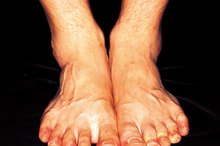Reasons for High Creatinine and Uric Acid
Numerous conditions cause high levels of creatinine and uric acid in your body. According to the MedlinePlus website, creatinine is a breakdown product of creatine, an important part of your muscles 1. Uric acid is a chemical that is created when your body breaks down purines -- substances found in certain foods and beverages such as liver, anchovies, mackerel, beer and wine. Certain medical conditions elevate creatinine and uric acid.
If you are experiencing serious medical symptoms, seek emergency treatment immediately.
Kidney Disease
Kidney disease elevates creatinine and uric acid. According to the National Institute of Diabetes and Digestive and Kidney Diseases, or NIDDK, over 100,000 Americans are diagnosed with kidney disease each year. Kidney disease, also known as kidney failure, is a serious condition that impairs the kidneys to rid your body of metabolic waste products. Kidney failure is the end-stage of chronic kidney disease. The NIDDK states that diabetes and hypertension are the most common causes of kidney disease, although other conditions can also cause kidney failure.
- Kidney disease elevates creatinine and uric acid.
- The NIDDK states that diabetes and hypertension are the most common causes of kidney disease, although other conditions can also cause kidney failure.
Renal Insufficiency
How Does Creatine Affect the Kidneys?
Learn More
Renal insufficiency is a kidney-related condition that can cause increased creatinine and uric acid levels. The University of California-Davis Health System describes renal insufficiency as the poor function of kidneys possibly caused by a reduction of blood flow to your kidneys 3. Renal artery disease, or renal artery stenosis, decrease blood flow to your kidneys 4. According to the Cleveland Clinic common signs and symptoms associated with renal insufficiency include elevated levels of creatinine and uric acid, increased blood pressure, fluid retention and heart problems 124.
Congestive Heart Failure
Congestive heart failure can cause increased creatinine and uric acid levels 5. According to the University of Maryland Medical Center, or UMMC, congestive heart failure is an ongoing condition that develops gradually 5. If you have congestive heart failure, your heart is unable to pump adequate amounts of blood to your cells, tissues and organs 5. As your heart's ability to pump blood diminishes, blood can back up into your lungs, liver or legs. High blood pressure and coronary artery disease rank as the most common causes of congestive heart failure, according to UMMC 5.
Related Articles
References
- MedlinePlus: Creatinine - Blood
- MedlinePlus: Uric Acid - Blood
- University of California-Davis Health System: Renal Insufficiency
- Cleveland Clinic: Renal Artery Disease
- UMMC: Heart Failure
- Bellomo R, Kellum JA, Ronco C. Acute kidney injury. Lancet. 2012;380(9843):756-66. doi:10.1016/S0140-6736(11)61454-2
- Yang Y, George KC, Shang WF, Zeng R, Ge SW, Xu G. Proton-pump inhibitors use, and risk of acute kidney injury: a meta-analysis of observational studies. Drug Des Devel Ther. 2017;11:1291-1299. doi:10.2147/DDDT.S130568
- Park JT. Postoperative acute kidney injury. Korean J Anesthesiol. 2017;70(3):258-266. doi:10.4097/kjae.2017.70.3.258
- Bindroo S, Challa HJ. Renal Failure. In: StatPearls [Internet]. Treasure Island (FL): StatPearls Publishing; 2019 Jan-. Updated March 5, 2019.
- Makris K, Spanou L. Acute Kidney Injury: Definition, Pathophysiology and Clinical Phenotypes. Clin Biochem Rev. 2016;37(2):85-98.
- Larach DB, Engoren MC, Schmidt EM, Heung M. Genetic variants and acute kidney injury: A review of the literature. J Crit Care. 2018 Apr;44:203-211. doi:10.1016/j.jcrc.2017.11.019
- Mansoor K, Kheetan M, Shahnawaz S, et al. Systematic review of nephrotoxicity of drugs of abuse, 2005-2016. BMC Nephrol. 2017;18(1):379. doi:10.1186/s12882-017-0794-0
- Varga ZV, Matyas C, Paloczi J, Pacher P. Alcohol Misuse and Kidney Injury: Epidemiological Evidence and Potential Mechanisms. Alcohol Res. 2017;38(2):283-288.
- Hopp S, Dominici F, Bobb JF. Medical diagnoses of heat wave-related hospital admissions in older adults. Prev Med. 2018 May;110:81-85. doi:10.1016/j.ypmed.2018.02.001
Writer Bio
Martin Hughes is a chiropractic physician, health writer and the co-owner of a website devoted to natural footgear. He writes about health, fitness, diet and lifestyle. Hughes earned his Bachelor of Science in kinesiology at the University of Waterloo and his doctoral degree from Western States Chiropractic College in Portland, Ore.







